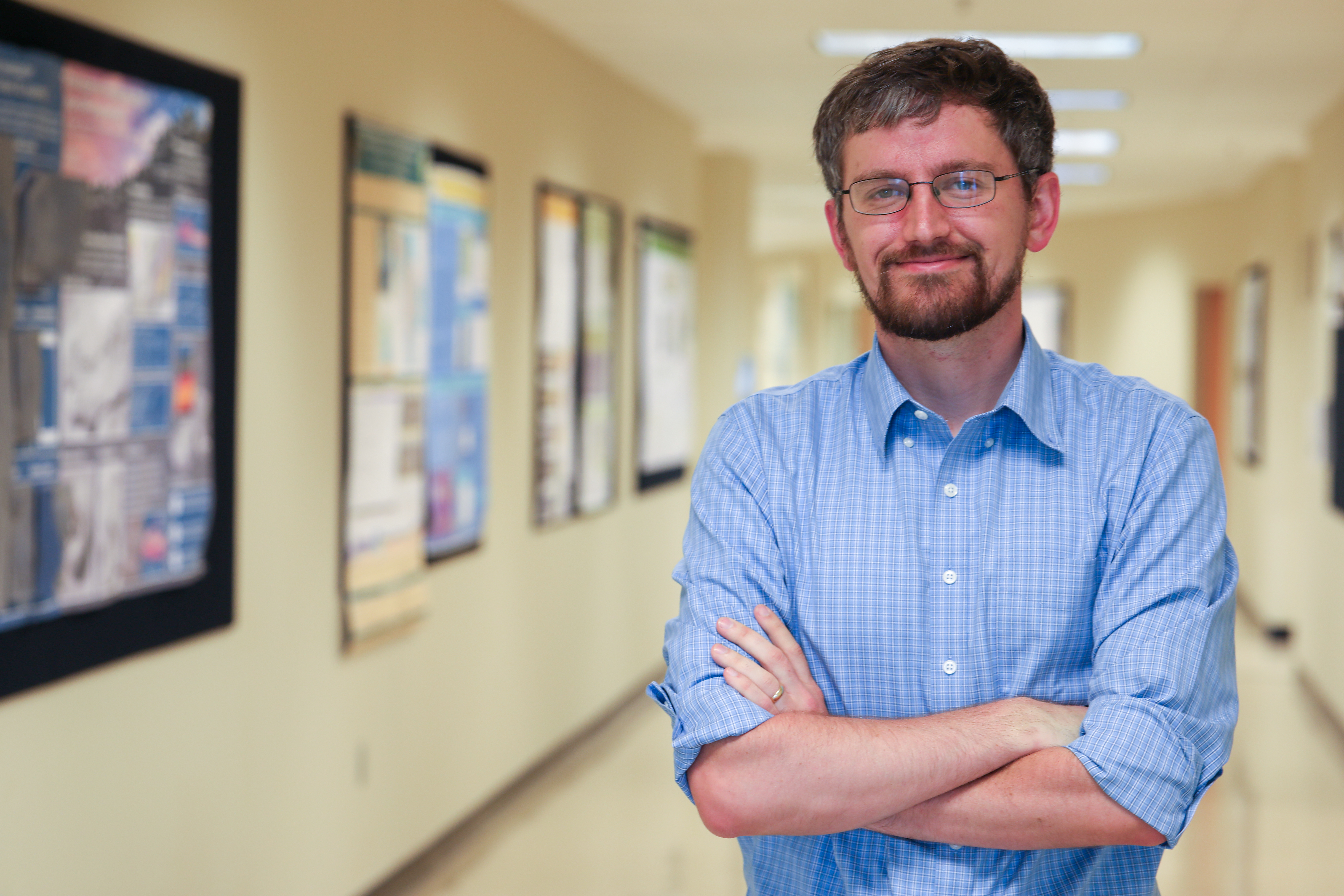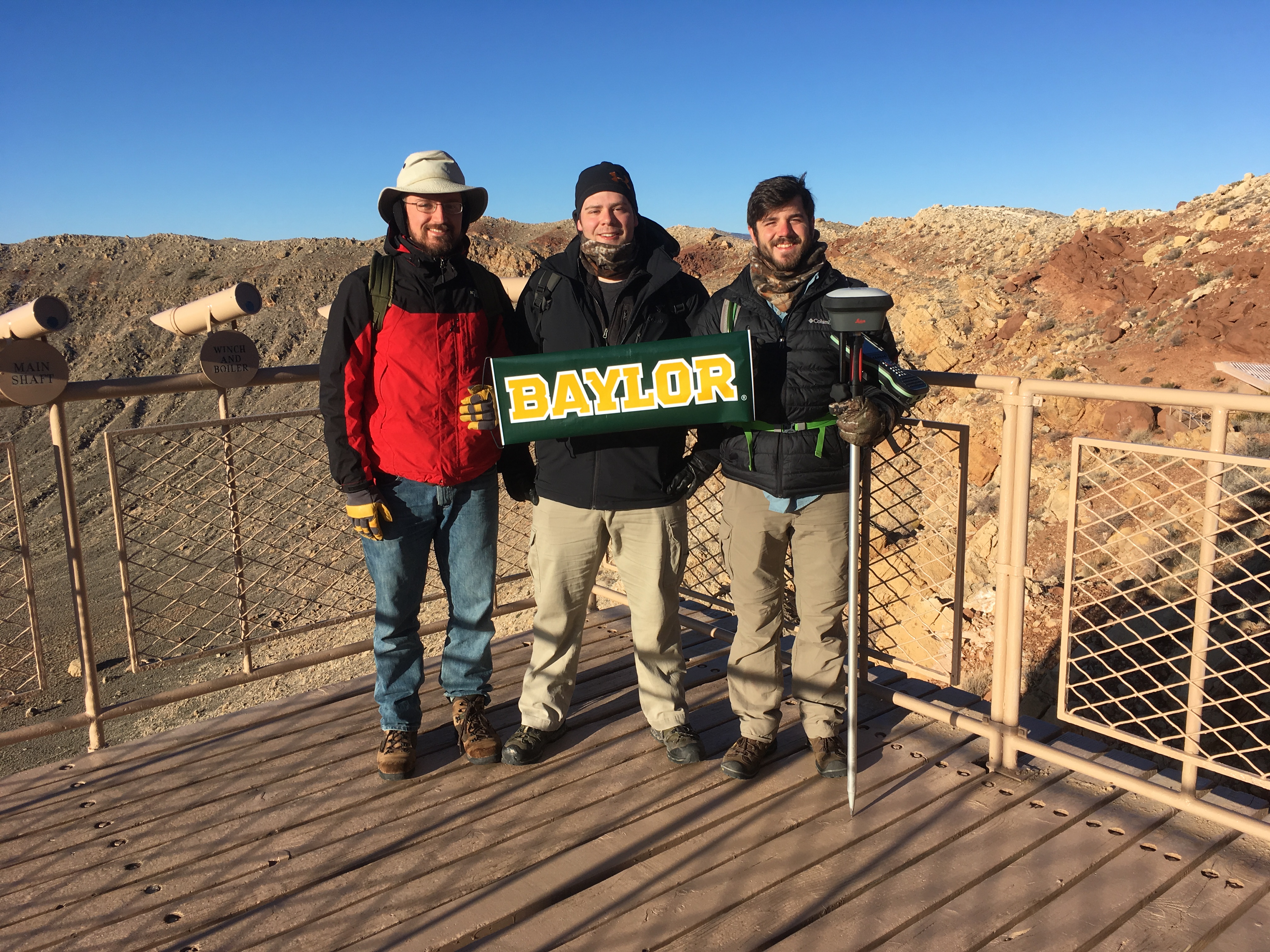Baylor Planetary Geophysicist Receives Esteemed Early Career Award from NASA
Peter B. James, Ph.D., selected for prestigious NASA award for his contributions to planetary science

Contact: Shelby Cefaratti-Bertin, Baylor University Media & Public Relations, 254-327-8012
Follow us on Twitter: @BaylorUMedia
WACO, Texas (May 30, 2024) – Baylor University planetary geophysicist Peter B. James, Ph.D., assistant professor and founder of the Planetary Research Group at Baylor, has been recognized by NASA with the 2023 Planetary Science Early Career Award (ECA). NASA selected James for the award based on his demonstrated leadership, involvement in the planetary science community and potential for future impact.
NASA’s ECA program supports exceptional early-career scientists who play a meaningful role in the planetary science community to pursue professional development in areas relevant to NASA’s Planetary Science Division through a grant of up to $200,000. James will receive seed funding from NASA for a project titled “Origins of porosity on rocky planetary surfaces.” Porosity is the percentage of a rock that is composed of empty space, and James’ work explores the way craters and volcanoes create porosity, or tiny empty spaces inside the bedrock.
“On a professional level, this award from NASA will give us the resources needed to grow the Planetary Research Group here at Baylor,” James said. “Personally, the book of Proverbs says: ‘It is the glory of God to conceal things, but the glory of kings is to search things out.’ God filled the solar system with endless little mysteries, and it’s a joyful privilege to explore them.”
As a participant on the science teams of three NASA missions – the Lunar Reconnaissance Orbiter (LRO), the Gravity Recovery and Interior Laboratory (GRAIL) and the MErcury Surface, Space ENvironment, GEochemistry, and Ranging (MESSENGER) mission – James has focused much of his career on interpreting gravity field data from spacecrafts orbiting around other planets.
“Gravity anomalies are created by concentrations of mass, and a highly porous rock has less mass – therefore, we were able to use gravity field data to infer how porous other planets’ crusts are,” he said. “After arriving at Baylor, I branched out into terrestrial analogue studies as well. My group has been doing geophysical surveys of craters on Earth as a way to understand the millions of craters that exist on other planets in our solar system.”
With the NASA award, James will focus on three main tasks, including using craters on Earth as analogous to craters observed on the Moon and Mars.
- Survey a silicic volcano in Utah: James will collaborate with UCF planetary geologist Kerri Donaldson-Hanna, Ph.D. – the primary investigator for the “Lunar-VISE” mission heading to the Moon in 2027 – on a survey of a silicic volcano in Utah that could be comparable to the volcanoes that James previously studied on the Moon.
- Impact craters in Texas: James will create a program, or “crater boot camp,” to train undergraduate students at the University of Texas Permian Basin in Odessa, Texas, in survey techniques to understand the cluster of several small impact meteor craters found south of Odessa, which are similar to the craters being explored by the Mars Curiosity and Perseverance rovers. The research and results found through the crater boot camp will be presented at the Texas Area Planetary Science (TAPS) annual meeting, of which Baylor is a founding member.
- Apollo astronaut collaboration: In collaboration with Apollo 17 astronaut Harrison Schmitt, Ph.D., who was the 12th person to walk on the Moon, James and his team will pursue an innovative synthesis of ground-based gravimetry, collected by Schmitt in 1972, and orbital data, collected by the GRAIL mission in 2012. “If this project is successful,” James said, “we have high aspirations that it may someday lay the foundation for data collection by future astronauts.”
The NASA award also includes a broader impact focus in which James will engage community audiences with his current research at the Mayborn Museum, a natural science and cultural history museum in central Texas.
ABOUT PETER B. JAMES, PH.D.
Peter B. James, Ph.D., assistant professor of planetary geophysics at Baylor University, served on the science team of three NASA missions: the Lunar Reconnaissance Orbiter (LRO), the Gravity Recovery and Interior Laboratory (GRAIL), and the MErcury Surface, Space ENvironment, GEochemistry, and Ranging (MESSENGER) mission. He is the founder of Baylor University's Planetary Research Group, which is collaborating with Goddard Space Flight Center on multiple projects to study the Moon and the planet Mercury. James specializes in the use of spacecraft data to study the crusts and mantles of planets and moons in the solar system. He earned his Ph.D. from the Massachusetts Institute of Technology.
ABOUT BAYLOR UNIVERSITY
Baylor University is a private Christian University and a nationally ranked Research 1 institution. The University provides a vibrant campus community for more than 20,000 students by blending interdisciplinary research with an international reputation for educational excellence and a faculty commitment to teaching and scholarship. Chartered in 1845 by the Republic of Texas through the efforts of Baptist pioneers, Baylor is the oldest continually operating University in Texas. Located in Waco, Baylor welcomes students from all 50 states and more than 100 countries to study a broad range of degrees among its 12 nationally recognized academic divisions.
ABOUT THE COLLEGE OF ARTS & SCIENCES AT BAYLOR UNIVERSITY
The College of Arts & Sciences is Baylor University’s largest academic division, consisting of 25 academic departments in the sciences, humanities, fine arts and social sciences, as well as 11 academic centers and institutes. The more than 5,000 courses taught in the College span topics from art and theatre to religion, philosophy, sociology and the natural sciences. The College’s undergraduate Unified Core Curriculum, which routinely receives top grades in national assessments, emphasizes a liberal education characterized by critical thinking, communication, civic engagement and Christian commitment. Arts & Sciences faculty conduct research around the world, and research on the undergraduate and graduate level is prevalent throughout all disciplines. Visit the College of Arts & Sciences website.
